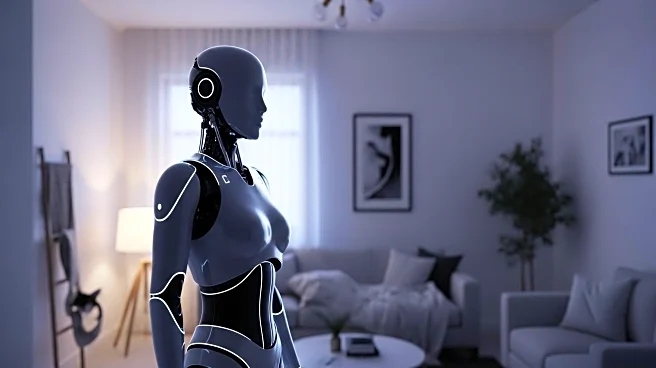What's Happening?
A recent survey conducted by researchers at the University of Washington explored public attitudes towards humanoid robots in domestic settings. The study involved 76 participants from the U.S. and the U.K., who were asked about their preferences for humanoid robots versus special-purpose robots for tasks such as eating, dressing, and vacuuming. The findings indicate a general preference for specialized robots over humanoids, citing concerns about safety, privacy, and comfort. Despite the optimistic framing of scenarios where humanoids were assumed to have passed extensive safety testing, participants expressed unease about potential hazards and privacy issues. The study highlights a significant investment in humanoid robotics, with companies like Tesla and Figure AI promoting their robots for home use, yet public acceptance remains uncertain.
Why It's Important?
The survey's results are crucial as they reflect the public's apprehension towards integrating humanoid robots into everyday life, despite significant investments from major tech companies. This hesitation could impact the future of the humanoid robotics market, which Goldman Sachs projects could reach $38 billion by 2035. The preference for specialized robots suggests a potential shift in consumer demand, influencing how companies design and market their products. The concerns raised about safety and privacy underscore the need for rigorous testing and regulatory approval before widespread adoption. As the population ages, the demand for assistive technologies will grow, making it essential for companies to address these concerns to ensure successful integration into homes.
What's Next?
The study suggests that humanoid robotics companies need to conduct more in-depth market research to understand consumer preferences and address safety and privacy concerns. As the technology advances, companies may need to pivot towards developing specialized robots that are more acceptable to the public. Additionally, further research and testing are necessary to ensure that humanoid robots can safely and effectively perform tasks in domestic environments. The findings may encourage companies to explore alternative designs that are less human-like and more practical for home use. The ongoing dialogue between researchers, companies, and consumers will be crucial in shaping the future of robotics in domestic settings.
Beyond the Headlines
The ethical implications of humanoid robots in homes are significant, as they raise questions about privacy, autonomy, and the potential replacement of human caregivers. The uncanny valley effect, where humanoid robots evoke discomfort due to their human-like appearance, could hinder acceptance. The study suggests that simpler, cartoon-like designs may be more appealing to users, highlighting the importance of considering emotional responses in robot design. As the technology evolves, it will be essential to balance innovation with ethical considerations to ensure that robots enhance rather than detract from human life.









